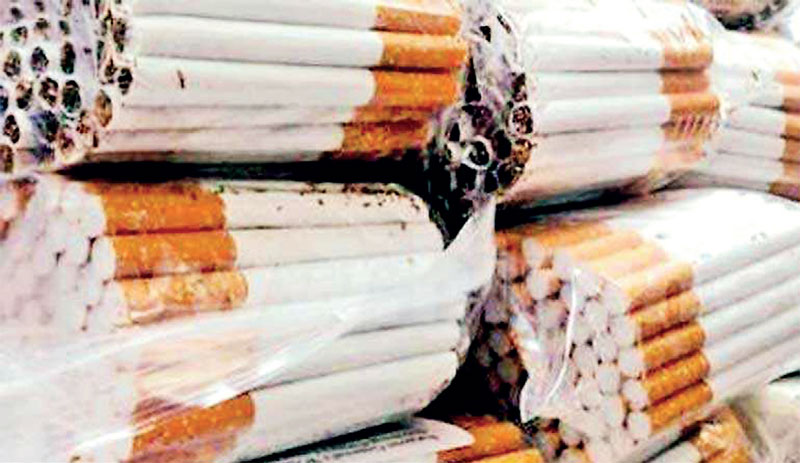Sunday Feb 22, 2026
Sunday Feb 22, 2026
Friday, 10 December 2021 01:52 - - {{hitsCtrl.values.hits}}

Over 460 million illicit cigarettes were smuggled into the island in 2017; this number increased exponentially to a record 740 million in 2019, before dipping marginally to 730 million last year
By P.A. Rajawasam
With its Budget proposals for 2022, the Government took a deliberate and pragmatic approach towards cigarette pricing. Whilst many anticipated a price increase in the range of Rs. 20 a stick, the Government instead raised prices by just Rs. 5. This measure would appear fallacious at first glance, but instead it paves the way for sustainable revenue generation and helps address a number of social and health issues that had cropped up in recent times.
Critically, the Government appears to have taken note of the significant threat posed to the country from the proliferation of illicit cigarettes in the market. Over the past five years, Sri Lanka has emerged a global hotspot for cigarette smugglers, drawn by the lure of substantial profits due to its high price environment.
According to data from the Department of Customs and industry reports, over 460 million illicit cigarettes were smuggled into the island in 2017. This number increased exponentially to a record 740 million in 2019, before dipping marginally to 730 million last year. The Government is estimated to have lost Rs. 40 billion each in this year and the last due to illicit cigarettes, which is a significant number in this current milieu. In 2021, Sri Lanka recorded its single largest detection of illicit sticks of over 203 million sticks.
Sri Lanka is a hotspot for cigarette smugglers simply because it is the most expensive country for cigarettes in the world. Smuggled cigarettes are available in the market for as low as Rs. 45, whilst legal products average Rs. 70 a stick. Accordingly, a smuggled 40-foot container of illicit fags would yield over Rs. 450 million in profit to racketeers.
Despite the threat of detection, smugglers continue unabated as the maximum fine cigarette smuggling in Sri Lanka is just Rs. 1 million. The profit versus risk ratio simply does not stack up in the Government’s favour. With a saving of almost Rs. 25 sticks, consumers in Sri Lanka have increasingly turned to smuggled products and unashamedly brandishing them on social media.
Any move to increase cigarette prices further only gives further impetus to smugglers, as it significantly improves their chance at profit. But, with the Government strapped for cash due to the prolonged impact of COVID-19, it was critical to consider all avenues to enhance earnings. Accordingly, a Rs. 5 increase sits well with the twin objectives of maintaining Government earnings from the tobacco industry, without unduly provoking smugglers. Any increase of over Rs. 10 would have resulted in plummeting sales of legitimate products and consumers rushing to illicit products.
The growth of the illicit segment over the past five years also provides ample proof that unfettered price hikes only serve to discourage consumers from using legitimate products and drives them underground. This is in turn results in severe erosion of law and order. On one hand it drives consumers to seek cheaper illicit alternatives, whilst on the other hand regulations encourage smugglers to target Sri Lankans for ill-gotten gains, which have also been linked to funding terrorism.
There is little purpose in crowing about driving legitimate cigarette consumption down when illicit cigarette sales are thriving all around the country. It reflects badly on our country’s tobacco control measures. Education still remains the key to controlling tobacco consumption here in Sri Lanka and the rest of the world. Furthermore, with real smoking incidence unchanged due to the prevalence of illicits, the impact of smoking on our public health remains unchanged. With little or no focus from authorities and agencies on countering the illicit segment this would continue to heap burden on the health system.
Accordingly, it is timely the Government has factored the prevalence and threats posed by illicit cigarette smuggling and adopted a pragmatic approach with its pricing policy. Statistics show that following the excessive cigarette price hike of 2019, smuggling increased two-fold and government must take progressive measures to strengthen its border controls.
The Government Budget of 2022 has considered many home truths and proposed corrective actions for a number of sectors. We earnestly hope these measures would continue into the medium-term as envisaged to support the development journey of the country.
(The writer is an electronics engineer who has served in the public and private sector as Director and Consultant on several infrastructure projects around the island for the past 30 years.)